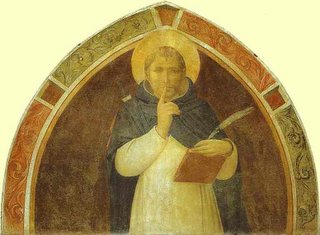 We need a listening theology, a kneeling theology, a praying theology--not a hermeneutic of suspician, but a hermeneutic of adoration. Christoph Cardinal Schoenborn put it well, in three points, a few years ago:
We need a listening theology, a kneeling theology, a praying theology--not a hermeneutic of suspician, but a hermeneutic of adoration. Christoph Cardinal Schoenborn put it well, in three points, a few years ago:"The first interest in theology has to be a common look at the object. It is not of primary interest what this or that theologian has said about Christ; rather, the passion in theology has to be to know Christ himself, to approach his mystery, to approach Christ himself.
"Who is Christ? That is the path of theology. If a theologian can help us find a better approach to Christ, that is good. But it is not my first interest to have my method, my methodology, and to defend it against others. I want to approach reality.
"The second point: Back to the masters. It is so sad to lose time with secondary authors. Read St. Irenaeus, read St. Anselm, read the Church Fathers, St. Thomas Aquinas, St. Bonaventure--but do not read all the secondary stuff that floats around our libraries. In Germany there are 7,000 theological titles published every year. Who can read all this stuff without getting indention? It is much better to have read, during theological formation, the Confessions of St. Augustine, than a book about Augustine.
"Third point: the saints are the true theologians. If we consider what theology truly is, we must consider what St. Thomas Aquinas says about connaturality to the object. The study of languages is important-Latin, Greek, and Hebrew, if possible-but this is not enough if the seminarian does not grow in a certain connaturality with the object. That means he learns not only by intellect, but by experience. St. Thomas speaks, with Dionysius the Aeropagite, about the pati divina-not just to approach the things of God, the reality of God-but to suffer it, to be formed by what we study, to be tranformed by the object. This is the meaning of connaturality with what we study: familiarity with it.
"The best formation comes when we become familiar with Christ, when the Holy Spirit leads our thoughts and our heart, and grace transforms our habits. Then we judge theologically, not only by reason, but by the heart. We made a judgment not only through intellectual knowledge, but through a spiritual intuition about what is right and what is wrong. It is vital during theological studies, then, to read the saints. Isn't it true that only great intellectual capacity joined with true sanctity makes the true theologian?
"My last point is the relation between study and prayer. It is an obvious point, but one worth recalling. Theology is sound only if it is a praying theology."

2 comments:
And of course, the man who enjoins us to listen in the image at the top of this post is St. Peter Martyr, whose best known (possibly only known) theological work was the words, "Credo in Deum," written in his own blood as he lay dying.
The saints indeed are the true theologians.
Yes, Tom, thanks! And can't you imagine a wonderful Catholic school curriculum for religion that is basically a read-through of the lives of great saints? Or, even if we had to cater to the poor fact that it's hard for our students to read (!), we could watch a series of fine movies--A Man for All Seasons, Becket, Brother Sun Sister Moon, Romero, etc--that would teach our students more than most of the pop-tapioca lollipops of Religious Education nowadays!?!
Post a Comment